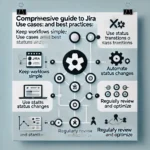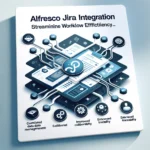Jira vs. GitLab: Choosing the Right Tool for Effective Project Management and Version Control
In the realm of software development and project management, having the right tools can make all the difference in productivity, collaboration, and successful project delivery. Jira and GitLab are two powerful platforms that cater to different aspects of the development process. While Jira focuses on project management, issue tracking, and team collaboration, GitLab is primarily designed for version control and continuous integration/continuous deployment (CI/CD). In this blog post, we will explore the strengths and differences between Jira and GitLab, helping you make an informed choice based on your team’s specific needs.
Jira: Streamlined Project Management and Issue Tracking
Jira, developed by Atlassian, is a popular and robust project management tool that facilitates agile development and issue tracking. It enables teams to plan, track, and manage projects efficiently through a series of customizable workflows and boards. Key features of Jira include:
- Project Management: Jira provides a centralized platform for teams to create and manage projects, set priorities, assign tasks, and track progress. It supports various agile methodologies like Scrum and Kanban.
- Issue Tracking: With Jira’s intuitive interface, teams can create, assign, and prioritize issues, bugs, or tasks. This helps identify roadblocks and streamline issue resolution.
- Customizable Workflows: Jira allows teams to create custom workflows to match their specific development processes, ensuring smooth and efficient project execution.
- Reporting and Analytics: Jira provides insightful reports and analytics, enabling teams to evaluate performance, identify bottlenecks, and make data-driven decisions.
- Integration: Jira seamlessly integrates with a wide range of third-party tools, allowing teams to enhance their workflow and collaborate effectively.
https://synapsefabric.com/2023/07/24/agile-vs-sdlc-embracing-flexibility-or-embracing-structure/
GitLab: Version Control and CI/CD Automation
GitLab, on the other hand, is a complete DevOps platform that focuses on version control, continuous integration, and continuous deployment. It is built around Git, the distributed version control system, and offers numerous features for end-to-end software development. Key features of GitLab include:
- Version Control: GitLab provides a robust version control system based on Git, allowing teams to manage code repositories efficiently, review changes, and collaborate on projects effectively.
- CI/CD Automation: GitLab’s built-in CI/CD pipelines automate the process of building, testing, and deploying code changes. This streamlines the development cycle and helps ensure code quality and reliability.
- Code Review and Collaboration: GitLab offers code review tools that facilitate collaboration among team members, enabling them to provide feedback and merge changes seamlessly.
- Issue Tracking (GitLab Issues): While GitLab focuses primarily on version control, it also provides issue tracking capabilities within the platform, allowing teams to manage tasks and bugs directly tied to their codebase.
- Security and Compliance: GitLab includes security features like container scanning, static code analysis, and compliance management, ensuring the safety and reliability of software products.
Choosing the Right Tool
The choice between Jira and GitLab largely depends on the needs of your development team and the specific requirements of your projects:
- If your team requires a comprehensive project management tool with robust issue tracking and reporting capabilities, Jira is an excellent choice.
- If your main focus is on version control, CI/CD automation, and seamless collaboration in the development process, GitLab may be the better option.
- For organizations looking for an all-in-one DevOps platform that combines project management and version control, both Jira and GitLab can be integrated with other tools to create a unified development environment.
In conclusion, Jira and GitLab are powerful tools that excel in their respective domains. Jira stands out as a comprehensive project management and issue tracking platform, perfect for agile teams seeking efficient collaboration. On the other hand, GitLab shines as a complete DevOps solution, catering to version control, CI/CD automation, and seamless code collaboration.
Ultimately, the best choice for your team depends on your specific project requirements, existing toolset, and the development process you follow. By carefully evaluating the features and benefits of Jira and GitLab, you can select the tool that will optimize your team’s productivity and help you deliver high-quality software with confidence.






